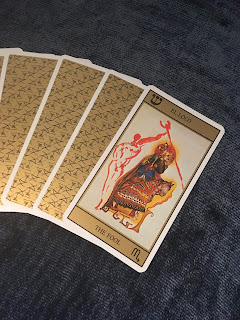Writing Rituals: Teas to Induce Creativity
Writing is the imaginary friend you drink tea with in the afternoon.
—Ann Patchett
Brewing tea is a ritual in and of itself. Setting the kettle, boiling water, steeping the leaves, spooning sugar, and pouring in cream have become my daily routine. I brew a strong cup of black tea when I wake up, drink green tea when I write, and curl up with herbal tea and a book before bed.
For writing, my favorite brews are mango or honeydew green tea with marigold blossoms. I like the fresh, grassy taste paired with the sweetness of the fruit and find it energizing yet soothing.
Sometimes I’ll drink something different depending on the story I’m writing. When I was working on a retelling of the Twelfth Night set in 17th-Century Paris, I would drink earl grey with cream and sugar. Try adopting the tastes of one of your characters, or drink tea found in the region that you’ve set your story.
Studies have shown that the neurotransmitter L-Theanine found in tea leaves, when combined with the plant’s natural caffeine, inspires well-being, increases focus, and boosts creativity, so there’s a reason so many writers structure their rituals around tea.
Unfortunately, if you have a heart condition or an anxiety disorder like me, too much caffeine may make you more anxious than motivated. But drinking decaffeinated or herbal teas can still impart creative benefits.
When you want to write, brew yourself a cup of tea. Even if you sit there staring at a blank page clutching the mug under your nose, keep making tea.
Do this at the same time every day, like you’re preparing for a long, productive writing session, despite your self-doubt, despite that imagined reality where the words never come and you sit there feeling frustrated and useless. You’re not wasting your time and effort if you continue to try.
Perform the magic until it works. Eventually, the more you reinforce the idea that tea leads to writing, you’ll brew a cup of tea one day, sit down at your desk, and write.
For writing, my favorite brews are mango or honeydew green tea with marigold blossoms. I like the fresh, grassy taste paired with the sweetness of the fruit and find it energizing yet soothing.
Sometimes I’ll drink something different depending on the story I’m writing. When I was working on a retelling of the Twelfth Night set in 17th-Century Paris, I would drink earl grey with cream and sugar. Try adopting the tastes of one of your characters, or drink tea found in the region that you’ve set your story.
Studies have shown that the neurotransmitter L-Theanine found in tea leaves, when combined with the plant’s natural caffeine, inspires well-being, increases focus, and boosts creativity, so there’s a reason so many writers structure their rituals around tea.
Unfortunately, if you have a heart condition or an anxiety disorder like me, too much caffeine may make you more anxious than motivated. But drinking decaffeinated or herbal teas can still impart creative benefits.
Tea as Ritual
Working magic is a form of self-empowerment--your actions hold the power, not arbitrary objects. That cup of tea isn’t your muse, it’s your conduit. Every time you complete your writing ritual, you’re reinforcing a certain mindset. Will this outcome into being: “I will overcome writer’s block.”When you want to write, brew yourself a cup of tea. Even if you sit there staring at a blank page clutching the mug under your nose, keep making tea.
Do this at the same time every day, like you’re preparing for a long, productive writing session, despite your self-doubt, despite that imagined reality where the words never come and you sit there feeling frustrated and useless. You’re not wasting your time and effort if you continue to try.
Perform the magic until it works. Eventually, the more you reinforce the idea that tea leads to writing, you’ll brew a cup of tea one day, sit down at your desk, and write.
Drink your tea slowly and reverently, as if it is the axis on which the world revolves—slowly, evenly, without rushing toward the future.
—Thich Nhat Hanh
Tea Correspondences
To get you started, here’s a list of teas I’ve found conducive for certain mental states. Many of them are scientifically proven to either energize or calm the drinker, but some are more subjective preferences. Choose what works for you, and remember, the tea isn’t the magic, it’s simply the object you use to actualize your will.Stimulate:
- Irish Breakfast: dark roasted leaves with a malty flavor and high caffeine
- Chai: black tea with fragrant spices and high caffeine
- Yerba Mate: strong herbal infusion with high caffeine
Focus:
- Sencha: green tea with a strong earthy flavor and medium caffeine
- Matcha: powdered green tea for a frothy, creamy drink
- Peppermint: cool, mint-infused water for motivation
Calm:
- Chamomile: floral infusion for stress relief often paired with lavender
- Rose: sweet floral infusion made from rose hips and petals
- White Tea: light flavor usually accompanied by floral or berry notes with minimal caffeine



Comments
Post a Comment